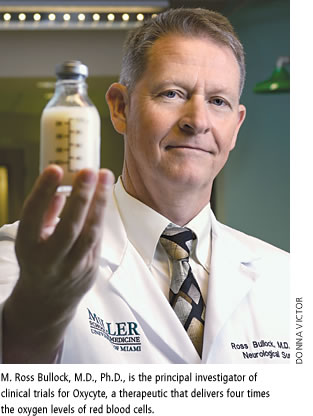 |
 |
 With traumatic brain injuries so prevalent in the Iraq war, the U.S. Department of Defense has agreed to fund $1.9 million of the cost of the trials on Oxycyte at the University of Miami and Virginia Commonwealth University. Oxycyte is a perfluorocarbon-based oxygen therapeutic that has shown the ability to deliver four times more oxygen than red blood cells to damaged brain tissue. With traumatic brain injuries so prevalent in the Iraq war, the U.S. Department of Defense has agreed to fund $1.9 million of the cost of the trials on Oxycyte at the University of Miami and Virginia Commonwealth University. Oxycyte is a perfluorocarbon-based oxygen therapeutic that has shown the ability to deliver four times more oxygen than red blood cells to damaged brain tissue.
M. Ross Bullock, M.D., Ph.D., professor of neurological surgery and director of clinical neurotrauma and principal investigator of Phase II clinical trials for the therapeutic oxygen carrier, will begin the trials this winter. If Oxycyte, developed by Synthetic Blood International, is successful in civilian trials, it could be used in the battlefields in a year or two. Beyond that, there are other potential uses. W. Dalton Dietrich, Ph.D., scientific director at The Miami Project to Cure Paralysis, says he and other researchers will be taking a closer look at Oxycyte for use in spinal cord injury.
The Phase II trial is expected to last two years, involving 200 patients at hospitals in the U.S., including Jackson Memorial Hospital, the University of Pennsylvania, Virginia Commonwealth University, Fairfax Hospital in Virginia, and possibly hospitals in Toronto, Germany, and Switzerland.
|
 |
 |


